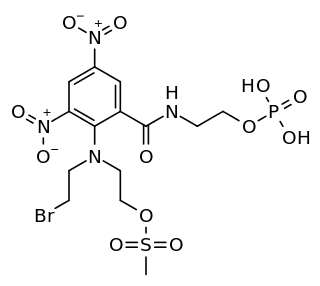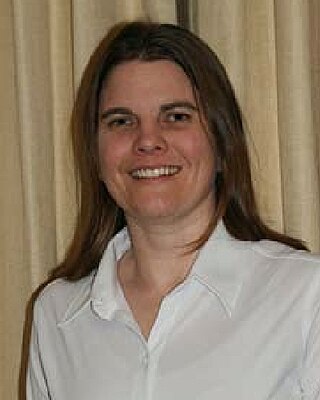
Tumor hypoxia is the situation where tumor cells have been deprived of oxygen. As a tumor grows, it rapidly outgrows its blood supply, leaving portions of the tumor with regions where the oxygen concentration is significantly lower than in healthy tissues. Hypoxic microenvironments in solid tumors are a result of available oxygen being consumed within 70 to 150 μm of tumor vasculature by rapidly proliferating tumor cells thus limiting the amount of oxygen available to diffuse further into the tumor tissue. In order to support continuous growth and proliferation in challenging hypoxic environments, cancer cells are found to alter their metabolism. Furthermore, hypoxia is known to change cell behavior and is associated with extracellular matrix remodeling and increased migratory and metastatic behavior.
Dehydroascorbic acid (DHA) is an oxidized form of ascorbic acid. It is actively imported into the endoplasmic reticulum of cells via glucose transporters. It is trapped therein by reduction back to ascorbate by glutathione and other thiols. The (free) chemical radical semidehydroascorbic acid (SDA) also belongs to the group of oxidized ascorbic acids.

Paul Workman is a British scientist noted for his work on the discovery and development of pharmaceutical agents in the field of oncology. He is President and CEO of The Institute of Cancer Research In London.
Xiaodong Zhang is a Professor of Macromolecular Structure and Function at Imperial College London.

PR-104 is a drug from the class of hypoxia-activated prodrugs (HAPs), which is being researched as a potential anti-cancer therapeutic agent. It is a phosphate ester “pre-prodrug” that is rapidly converted to the HAP PR-104A in the body. PR-104A is in turn metabolised to reactive nitrogen mustard DNA crosslinking agents in hypoxic tissues such as found in solid tumours. Following initial clinical studies, it was discovered that PR-104A is also activated by the enzyme AKR1C3, independently of hypoxia. Hypoxia in the bone marrow of patients with leukaemia, and high activity of AKR1C3 in some leukaemia subtypes has led to interest in clinical trials of PR-104 in relapsed refractory acute leukaemias.

Intravenous Ascorbic Acid or PAA, pharmacologic ascorbic acid, is a process that delivers soluble ascorbic acid directly into the bloodstream. It is not approved for use to treat any medical condition.
Margreet Catherina Maria Vissers is a New Zealand biochemistry academic, and as of 2019 is a full professor at the University of Otago.
Merilyn Manley-Harris is a New Zealand chemist, and is a professor emeritus at the University of Waikato, specialising in carbohydrate chemistry, particularly relating to mānuka honey.
Roslyn A. Kemp is a New Zealand immunologist, and as of 2023 is a full professor at the University of Otago. Her research focuses on T cells, mucosal and tumour immune responses, inflammation and T cell memory.
Keren Elizabeth Dittmer is a New Zealand academic, and is professor of veterinary pathology at Massey University, specialising in animal skeletal pathology, vitamin D, and genetic diseases.

Kathryn Louise Beck is a New Zealand academic, a registered dietitian, and is a full professor at Massey University, specialising in dietary assessment, sustainable nutrition, and iron deficiency in young women and sportspeople.
Merilyn Hibma is a New Zealand viral immunologist, and is a full professor at the University of Otago, specialising in immune regulation by viruses, especially human papillomavirus, the causative agent of cervical cancer.
Catherine Ann Malcolm Stedman is a New Zealand pharmacologist and gastroenterologist, and is a clinical professor at the University of Otago, specialising in hepatitis C drug development. She is the first woman gastroenterologist to become a professor of medicine in New Zealand.
Gisela Sole is a South African–New Zealand academic physiotherapist, and is a full professor at the University of Otago, specialising in sports injuries and management of musculoskeletal conditions.
Lynley Carol Anderson is a New Zealand academic, and is a full professor at the University of Otago, specialising in bioethics in health care education and sports and sports healthcare provision.
Stephanie Margaret Hughes is a New Zealand molecular neurobiologist, and is a full professor at the University of Otago, specialising in gene therapy for the fatal childhood disorders known as Batten disease.
Robin Maree Turner is a New Zealand statistician, and is a full professor at the University of Otago, specialising in applying biostatistics to health-related research. She is the director of the Biostatistics Centre in the School of Medicine.
Janice Elizabeth Murray is a Canadian–New Zealand academic psychologist, and is professor emerita at the University of Otago. Her research focuses on object and face recognition, and age-related changes in perception.
Nuala Ann Helsby is a New Zealand academic, and is a full professor of molecular medicine and pathology at the University of Auckland, specialising in transport of anticancer pharmaceuticals and drug treatments for autoimmune conditions.
Sinéad Donnelly is an Irish–New Zealand academic, and is a full professor at the University of Otago, specialising in palliative care.




